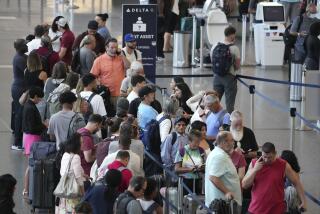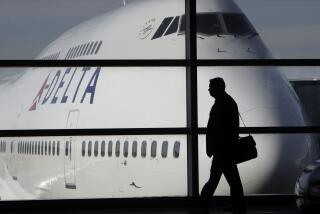Delta Air, UAL Report Big Losses
- Share via
United Airlines parent UAL Corp. and Delta Air Lines reported massive third-quarter losses Thursday in the aftermath of the Sept. 11 attacks, giving the airline industry a combined quarterly loss of about $2.5 billion that nearly erased its entire profit in 2000.
The losses in the three months ended Sept. 30 came despite the $2.5 billion already given to the airlines as part of the federal bailout the industry secured when passenger travel plunged after the terrorist attacks.
United and Delta also warned that their woes--a slow recovery of travel and their need to sell cheap tickets just to get people on their planes--would continue through the current quarter and well into next year. Indeed, most of the major airlines say they continue to lose several million dollars or more each day.
Delta’s performance, for instance, “will not begin to match previous [pre-Sept. 11] expectations until the last half of 2002,” Delta Chairman Leo Mullin told analysts in a conference call.
In another sign of how the airlines keep seeking ways to slash costs, Continental Airlines joined AMR Corp.’s American Airlines and began charging a $10 fee for paper tickets issued by the carrier.
The fee, which doesn’t apply to tickets issued by travel agents, is to cover distribution costs the airlines say are unnecessary with electronic ticketing. Other airlines, such as Northwest, said they’re also studying similar fees.
UAL, whose former chief executive, James Goodwin, abruptly quit Sunday amid United’s deepening malaise, said its third-quarter net loss was $1.16 billion, or $21.43 a diluted share, the worst quarterly performance in its 75-year history.
“Our results this quarter reflect the sharp falloff in both business and leisure travel that has occurred, and we anticipate continued weakness in both of these sectors into next year,” John Creighton Jr., who succeeded Goodwin, said in a statement.
Delta’s net loss was $259 million, or $2.13 a share, which was better than the $2.70-a-share loss forecast by analysts surveyed by Thomson Financial/First Call. A year earlier, Delta earned $133 million, or $1.01 a share.
UAL and Delta are the last major airlines to report their third-quarter results, and the industry’s enormous losses were not unexpected. Ever since air travel plummeted after Sept. 11, industry analysts have forecast that the carriers together would lose at least $5 billion this year.
The industry’s worst quarter on record was the fourth quarter of 1990, when the airlines lost $3.6 billion amid the Persian Gulf war and an economic recession, according to the industry’s trade group, the Airline Transport Assn.
Even before the attacks, the airlines were in deep trouble because business travel--their most lucrative market segment--had nose-dived amid the current slowdown in the U.S. economy. After the attacks, most airlines immediately slashed their operations by 15% or more and together eliminated more than 100,000 jobs in an effort to survive the falloff in travel.
The airlines also launched fare sales to get more people flying, but the carriers need a much heftier surge in travel, especially higher-income business travel. That would lift average fares--known as yields in industry parlance--high enough to offset the airlines’ costs and provide a profit.
“Without a major pick-up in yields and a significant improvement in the business/leisure fare mix,” the airlines’ incomes “are unlikely to rebound and operating cash flow will remain weak,” Bill Warlick, airline analyst at credit-rating agency Fitch Inc., said Thursday in a report.
“Should this weakness persist, U.S. airlines would be forced to consider further reductions in capacity and a new round of cost cuts,” he said.
Also, the rebound in air travel since Sept. 11 is leveling off. About 7.5 million people took domestic flights in the week ended Sunday, roughly the same as in each of the prior two weeks, according to the ATA.
To be sure, UAL and Delta are among the airlines that aren’t in danger of failing any time soon. Each has more than $2 billion in cash and the ability to borrow more. They also can tap the bailout’s loan guarantee program. But analysts said the airlines are still burning through cash at an alarming rate.
Elk Grove Village, Ill.-based UAL said its third-quarter loss included $391 million of bailout cash already received, along with other one-time gains and special charges totaling $865 million, which included workers’ severance pay.
Excluding those items, UAL lost $542 million, or $10.05 a share, slightly better than the $10.27 a share analysts expected. A year earlier, UAL had a net loss of $116 million, or $2.17 a share. Its third-quarter revenue fell 16% to $4.1 billion from $4.9 billion.
Delta, based in Atlanta, said its third-quarter loss also included various charges and gains, including $104 million of bailout cash. The airline, which has cut its capacity by 16% and eliminated 13,000 jobs, said revenue in the quarter fell to $3.4 billion from $4.3 billion.
Despite the losses, airline stocks joined the market’s rally Wednesday. UAL shares rose 38 cents to close at $13.10, and Delta gained 80 cents to $23.66, both on the New York Stock Exchange.
More to Read
Inside the business of entertainment
The Wide Shot brings you news, analysis and insights on everything from streaming wars to production — and what it all means for the future.
You may occasionally receive promotional content from the Los Angeles Times.











